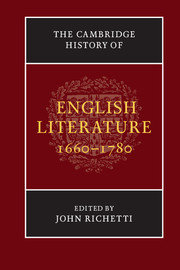Book contents
- Frontmatter
- Introduction
- PART I LITERARY PRODUCTION AND DISSEMINATION: CHANGING AUDIENCES AND EMERGING MEDIA
- PART II LITERARY GENRES: ADAPTATION AND REFORMATION
- PART III LITERATURE AND INTELLECTUAL LIFE: THE PRODUCTION AND TRANSMISSION OF CULTURE
- PART IV LITERATURE AND SOCIAL AND INSTITUTIONAL CHANGE
- PART V LITERARY GENRES: TRANSFORMATION AND NEW FORMS OF EXPRESSIVENESS
- 24 Personal letters
- 25 Diary and autobiography
- 26 The Gothic novel
- 27 Eighteenth-century travel literature
- 28 Women novelists 1740s–1780s
- 29 Burke and the uses of eloquence: political prose in the 1770s and 1780s
- PART VI CONCLUSION
- Chronology
- Bibliographies
- Index
- References
24 - Personal letters
from PART V - LITERARY GENRES: TRANSFORMATION AND NEW FORMS OF EXPRESSIVENESS
Published online by Cambridge University Press: 28 March 2008
- Frontmatter
- Introduction
- PART I LITERARY PRODUCTION AND DISSEMINATION: CHANGING AUDIENCES AND EMERGING MEDIA
- PART II LITERARY GENRES: ADAPTATION AND REFORMATION
- PART III LITERATURE AND INTELLECTUAL LIFE: THE PRODUCTION AND TRANSMISSION OF CULTURE
- PART IV LITERATURE AND SOCIAL AND INSTITUTIONAL CHANGE
- PART V LITERARY GENRES: TRANSFORMATION AND NEW FORMS OF EXPRESSIVENESS
- 24 Personal letters
- 25 Diary and autobiography
- 26 The Gothic novel
- 27 Eighteenth-century travel literature
- 28 Women novelists 1740s–1780s
- 29 Burke and the uses of eloquence: political prose in the 1770s and 1780s
- PART VI CONCLUSION
- Chronology
- Bibliographies
- Index
- References
Summary
Alexander Pope secretly arranged the publication of his own heavily manipulated letters in 1735. Lord Chesterfield employed letters to provide advice to his illegitimate son, advice that, in published form, supplied a conduct book for succeeding generations. Lady Mary Wortley Montagu gained posthumous fame by evoking life in Turkey through a series of letters published immediately after her death; James Boswell acquired early notoriety for his frivolous epistolary exchanges with another young man, published shortly after they were written. Thomas Gray's letters and William Cowper's were published, at least in part, for wide readerships soon after they died, and a selection of Horace Walpole's correspondence, chosen by him, appeared the year after his death. The familiar letters of travellers, literary celebrities and public wits attracted increasing audiences as the eighteenth century progressed in Britain. Well-codified generic rules often shaped their production. Letter-writing manuals had proliferated for several centuries, establishing public conventions for personal utterance. Yet, reading eighteenth-century correspondences from a chronological distance of more than two centuries, one can note diversity rather than conformity, feel the vigour of individual personality and marvel at the range of self-representation.
Liminalities and paradoxes mark personal letters in published form. Such letters poise between the public and the private: emanations of a solitary self, yet incomplete without an external reader; expressing the thoughts and feelings of an individual, yet couched partly in conventional terms; written for one particular other, but read by numerous originally unimaginable others; declaring authenticity but marked by artifice. Eighteenth-century interest in such paradoxes of private and public may be suggested by the proliferation of ostensible letters serving ostensibly public purposes.
- Type
- Chapter
- Information
- The Cambridge History of English Literature, 1660–1780 , pp. 623 - 648Publisher: Cambridge University PressPrint publication year: 2005
References
- 1
- Cited by

